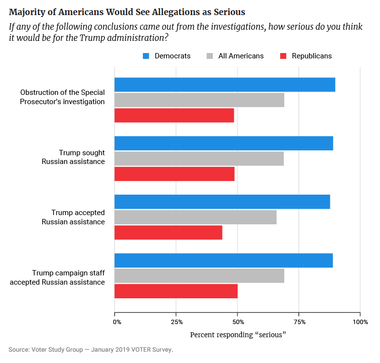
Key Findings
Almost two years ago, Robert Mueller was appointed as a special counsel to investigate Russian interference in the 2016 presidential election, including any links or coordination between Russia and the campaign of President Donald Trump. To date, this investigation has resulted in the indictment of 34 people and three companies. Six of those individuals were former Trump advisers and five have already plead guilty to a variety of charges.(i)
If recent reports are true, that investigation is drawing to a close. An official report detailing Mueller’s findings may soon be delivered to Attorney General William Barr and, potentially, released to the public.
This Democracy Fund Voter Study Group brief is an update to “Jumping to Collusions,” a report on public opinion around the Mueller investigation that we published in June 2018. This update shows how the public currently perceives the Mueller investigation, including its fairness and integrity, the seriousness of the allegations, and the appropriateness of certain actions that the president might take. It is based on the January 2019 VOTER Survey (Views of the Electorate Research Survey) of 6,779 Americans, most of whom had been surveyed previously as part of a longitudinal panel.
Along with the results presented in this brief, several of the findings from the original “Jumping to Collusions” brief still hold:
Despite a report by The New York Times that President Trump has attacked the Russia investigation and those leaders associated with it more than 1,100 times as “part of a strategy to beat back the investigations,”(ii) there has not been a substantial shift in attitudes relating to this topic.(iii)
A consistent plurality of Americans remains confident that the investigation is being conducted fairly (49 percent) and have a favorable opinion of Robert Mueller (41 percent). Interestingly, in the face of intense media coverage and efforts to undermine the investigation, almost a quarter (23 percent) of Americans still don’t have an opinion of Mueller. However, a clear majority (61 percent) still believe it would be inappropriate for Trump to remove him from the investigation.
About half (52 percent) of Americans think that members of the Trump campaign had improper contact with Russia during the 2016 election. Almost seven in ten Americans (69 percent) think that it would be serious if the Mueller investigation concluded that Trump or his campaign accepted or sought assistance from the Russian government. An identical number (69 percent) of Americans say it would be serious if Mueller found that Trump or his staff obstructed the investigation into Russian involvement in the 2016 election. About six in ten (60 percent) say it would be inappropriate for the president to issues pardons to senior members of his administration.
A consistent 44 percent of Americans believe the president should "definitely" or "probably be impeached" — including more than three-quarters of Democrats (78 percent), about three in ten independents (31 percent), and just 7 percent of Republicans.
That all of these figures have shifted only slightly in the last six months serves to illustrate how entrenched attitudes about the investigation have become.
Table 1
| Survey Response | May 2018 | Jan 2019 | Change |
|---|---|---|---|
| Confident Russia investigation is being conducted fairly | 48% | 49% | 1% |
| Favorable opinion of Robert Mueller | 38% | 41% | 3% |
| Inappropriate to remove Mueller from investigation | 60% | 61% | 1% |
| Confidence in Justice Department | 33% | 31% | -2% |
| Confidence in F.B.I. | 41% | 43% | 2% |
| Favorable opinion of James Comey | 29% | 27% | -2% |
| Trump campaign had improper contact with Russia | 51% | 52% | 1% |
| Would be serious if Mueller concluded that… | |||
| Trump accepted assistance from Russian government | 68% | 69% | 1% |
| Campaign staff accepted assistance from Russian government | 65% | 66% | 1% |
| Trump sought assistance from Russian government | 67% | 69% | 2% |
| Trump administration obstructed Russia investigation | 69% | 69% | 0% |
| Inappropriate to issue pardons for senior members of administration | 58% | 60% | 2% |
| Trump should be impeached | 44% | 44% | 0% |
Although the contents of the Mueller report are not yet known, there are two allegations many believe will be addressed in the document. One is that President Trump or a member of his campaign had inappropriate contact with the Russian government during the course of the 2016 election. Another is that President Trump or a member of his administration attempted to obstruct the Russia investigation.
About two-thirds of Americans believe it would be "very" or "somewhat serious" if the investigation concluded that Trump (69 percent) or members of his campaign staff (66 percent) accepted assistance from the Russian government during the 2016 election. A similar number (69 percent) say it would be serious if the investigation found that Trump sought assistance from the Russian government.
Separate from interactions with the Russian government, about two-thirds (69 percent) of Americans also say it would be serious if the investigation concluded that Trump or members of his administration attempted to obstruct the investigation into Russian involvement in the 2016 election.
There are substantial differences between partisans on these issues, but even Republicans believe that the investigation reaching these conclusions would be serious. A plurality of Republicans think it would be serious if the investigation concluded that Trump accepted (50 percent) or sought (49 percent) assistance from the Russian government, or obstructed the investigation into Russian election interference (49 percent). A plurality (44 percent) of Republicans also think it would be serious if the investigation found that members of Trump’s campaign accepted assistance from the Russian government.
Figure 1

All that said, no survey can predict how Americans will react to the conclusions reached in the Mueller report. Evidence presented in the report will itself be subject to political debate and public opinion could hinge on how political elites react to these conclusions.
As reported by The New York Times, the release of the Mueller report may mark the beginning of a series of congressional investigations — acting as a “road map” for oversight committees in the House of Representatives.(iv)
One of the tools available to these committees is their power to issue subpoenas — official orders to submit emails, documents, and testimony relating to their areas of oversight. As reported by The Washington Post, the Trump administration may be planning to broadly assert executive privilege when confronted with these orders.(v) Over the next year, it seems likely that inter-branch conflict over subpoenas will become one of the new battlegrounds in the long-running investigation into the Trump administration.
Today, a majority (59 percent) of Americans believe it would be "inappropriate" for the Trump administration to ignore subpoenas issued by the House — including 46 percent who say it would be "very inappropriate." By contrast, almost a quarter (23 percent) say such an action would be "appropriate." Seventeen percent of Americans said they did not know if it would be "appropriate" or "inappropriate."
However, Republicans (37 percent) are less likely than independents (49 percent) and Democrats (80 percent) to see this action as "inappropriate." In fact, four in ten (40 percent) Republicans say that ignoring a subpoena would be "appropriate" compared to just one in five independents (19 percent) and 11 percent of Democrats.
If the Mueller report does act as a “road map” for future investigations, these partisan divides may prove consequential. Indeed, if congressional oversight is the mechanism by which new evidence is produced, ambivalence among Republican voters on this issue may make it easier for President Trump and his allies to resist the investigation.
Subscribe to our mailing list for updates on new reports, survey data releases, and other upcoming events.